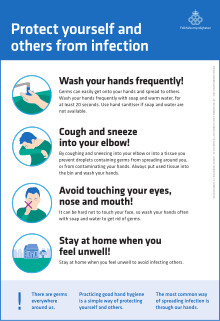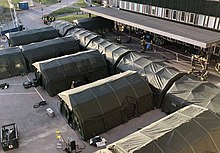COVID-19 pandemic in Sweden
Businesses and organizations were subject to distancing recommendations, regulations (mainly restaurants) and laws (banning public gatherings and events with more than 50 participants, as well as visits to nursing homes).
From late 2020 amidst a surge in cases, new legislation was passed enacting international travel restrictions and again limiting participation in public events, banning nursing home visits and closing upper secondary schools.
On 9 February 2022 almost all regulations and restrictions were abolished, and from 1 April 2022 COVID-19 was no longer classified as dangerous to the general public or society at large (although reporting requirements stayed in place).
[16] The pandemic put the Swedish healthcare system under severe strain, with tens of thousands of operations being postponed, and only emergency and COVID-related care being available during a surge in the winter of 2020.
[18] On 12 January, the World Health Organization (WHO) confirmed that a novel coronavirus (nCoV) was the cause of a respiratory illness in a cluster of people in Wuhan, in Hubei, China, who had initially come to the WHO's attention on 31 December 2019.
Sweden received high rankings regarding prevention of the emergence of a new pathogen, early detection and reporting of an epidemic of international concern and having a low risk environment.
[50] The second confirmed case was diagnosed at Sahlgrenska University Hospital, Gothenburg, on 26 February 2020, after a man who had recently returned from northern Italy following the outbreak in the country had developed symptoms.
[53] Many of those who tested positive for the virus during this early stage of the outbreak in Sweden had been infected while on vacation in Italy during the one-week spring break in late February.
[54] During the four-week period from February to March in which the spring break takes place in different areas of Sweden, around one million Swedes (about one tenth of the total population) had travelled abroad.
[55] Testing was initially primarily done on individuals who had developed symptoms after travelling from the areas hardest hit by the outbreak, such as China, Iran, northern Italy, Tyrol and South Korea, or those with pneumonia of unknown cause.
Subsequent whole genome sequencing studies carried out by the Public Health Agency proved that disease control measures including isolation and contact tracing had been largely successful in preventing the infection to spread from Italy.
[63][64] Responding to indications of local transmission in the Stockholm area and Västra Götaland, the Public Health Agency on 10 March raised the risk assessment of community spread from moderate to very high, which is the highest level.
[65][66] The first death was reported on 11 March, the same day as the COVID-19 outbreak was declared a pandemic by the WHO, when a person in their 70s from the Stockholm Metropolitan Area died in the intensive care unit of Karolinska University Hospital.
[68] Contact tracing would no longer be part of the strategy, and testing would instead focus on people already in hospital or those considered to belong to be of a bigger risk of a more severe disease.
[82] An independent commission released a report in December which criticized Sweden's approach for failing to protect care home residents by allowing the virus to become widespread.
The new laws allowed limiting number of visitors to shops, in contradiction with previous advice, and the Prime Minister said that a general lockdown was being considered, although was not implemented.
[106] Between 27 March and 3 April, the health agency tested approximately 800 randomly selected individuals in Stockholm County, to seek knowledge of the then current infection rate.
[111] In an April study by researchers at the KTH Royal Institute of Technology and the Science for Life Laboratory, home sample kits were mailed to 1,000 randomly selected individuals in Stockholm to be tested for the presence of antibodies against the SARS-CoV-2 virus which causes the COVID-19 disease.
[6] Professor Anders Björkman at Karolinska Institute interpreted this as suggesting underreporting discrepancies represents the majority of differences in COVID-19 deaths between the Nordic countries.
[223] The Gothenburg hospital was used for intensive care during a short time span, but was soon taken out of use following massive criticism from health-care workers who voiced concern for patient safety, increased risks of infection and working conditions.
[231][37] On 13 March, media reported that there was a shortage in personal protective equipment (PPE) for health care staff, and hospitals in Stockholm had been forced to reuse disposable PPEs after sanitation.
[237] As one of the main tasks of the Swedish Defence Force is to support the civil community in case of disasters, their resources were used to lessen equipment shortages in the health-care system.
[241] The economy was also affected by problems with global supply lines, which had forced some of the biggest manufacturing companies in Sweden, including Scania and Volvo Cars, to halt their production in March 2020, as well as a decrease in consumption.
The proposal included a system with a reduction in work hours where the government will pay half to salary, aiming to help businesses stay afloat without having to do layoffs.
[247] The budget emergency package proposed by the government in mid-March to lessen the economic impact of the crisis was supported across the political spectrum, including all parties in opposition in the Riksdag.
[248] On 2 April 2020, the Financial Supervisory Authority (Finansinspektionen) decided that Swedish banks temporarily can allow exemptions for housing mortgage lenders regarding amortising of loans.
[258] In mid-March, the parliamentary leaders from the parties in the Riksdag agreed on using pairing for the upcoming weeks, to make it possible to decrease the number of members of parliament present during voting sessions, from the usual 349 to 55.
This decision was taken both as a measure to lower the risk of spread of the infection (social distancing), and to make sure the daily work in the parliament could proceed even if a big number of MPs would become sick.
[267] The Almedalen Week, considered to be the biggest and most important forum in Sweden for seminars, debates and political speeches on current social issues, held in Visby every summer,[268] was cancelled as a result of the ban on large gatherings.
[299] On 19 March, the governing body for association football in Sweden formally announced that the premiere of the 2020 season for the first and second division leagues, men's Allsvenskan and Superettan as well as women's Damallsvenskan and Elitettan, will be postponed to late May or early June.






